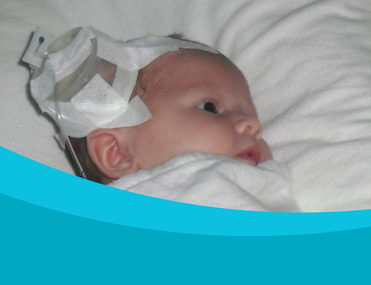Beverley, from Port Talbot in Wales, is keen to raise awareness of the dangers of Group B Strep and inform other mothers of the risks involved after birth. She tells their story here.
“While pregnant I was diagnosed as Strep B positive. This was explained to me as being a bacterial infection that could be treated before the baby's birth normally.
“Unfortunately, I am severely allergic to penicillin in antibiotics and this is how it would have been treated. No problem I was told, they would give the baby a 72-hour course of antibiotics as soon as he was born (not ideal, but no real choice!).
“I ended up being induced at 37 weeks due to a placental abruption and the baby had stopped growing.
Fast and traumatic birth
“After a very fast and traumatic birth my 4lb 9oz bundle flew into the world. In the five days I was in hospital before his birth I had to keep constantly reminding the midwives that I was Strep B and that the baby would need antibiotics. No-one seemed to know this already!
“After his birth I was not in a great condition for a few hours and eventually a paediatric consultant came to put a cannula in Asher and start the antibiotics.
“Some 72 hours later we went home as we both had a clean bill of health.
“Fast forward 10 weeks of everything being great and him growing and feeding well, until he woke up one morning really cranky, with a strange whiney cry that was new. He is my third son so sometimes you just get a feeling.
“He didn't feed well that day or take any fluids. He just cried this cry all day (he was a happy baby, it was odd). By about 4pm his temperature was hanging between 39-40, so I called 111 and spoke with them and a nurse called me back. She advised a trip straight to our local A&E.
Became very serious
“We went straight to the PAU and all of a sudden it became very serious. First there was one nurse, then there were about five and three consultants. They did a lot very quickly. I was asked to sit in the parents’ room while they did a lumbar puncture. Only then did it dawn on me that it could be the Strep B that I thought he had been treated for. I started to panic a little then.
“I was called back in. They had found three tiny non-blanching spots by his belly button that you would struggle to see and certainly were not a rash.
“He was cannulated and started on wide spectrum antibiotics, as even though we all thought we knew what strain this was you can never be too sure.
“We were moved to the ward and a private room with a bed for me too. He couldn't wear any clothes, just a nappy as he was so hot. After about 72 hours he was responding and seemed happier in himself.
“After five days we were discharged. It would seem all was fine and there were no major after-effects. It had been caught quickly and treated well.
Started wheezing
“Then at about 18 months he started wheezing very badly one winter day. On day two of the wheezing I went to the GP, who sent us to PAU again. They were concerned as his oxygen reading was down to 89. We were kept in for two days until they got his oxygen back up, and then discharged with an asthma treatment plan and a variety of pumps to use.
“Since then he has been hospitalised three more times for low oxygen levels, most recently in January 2020 twice (when you look back now you have to wonder!).
“These were clearly after-effects of the meningitis that we couldn't see at the time. This will be lifelong for him and the asthma plan that he follows is quite strict. The winter months are the worst. With the pandemic we are currently experiencing I am very aware that if Asher caught it he could be very, very unwell.
It keeps us vigilant
“It keeps us vigilant and aware that every cough or cold Asher gets can lead to a bad chest and asthma attacks, which are worse in the colder months.
“The Strep B positive result was really shrugged off while I was pregnant and even once he was born. There was no follow up blood test when he was a few weeks old that might have caught something.
"All pregnant women need to be informed of the risks involved after birth if they were Strep B, as it doesn't just go away and can cost your baby’s life if not diagnosed and treated quickly. The awareness needs to be far better during all ante-natal appointments, so parents are better educated on it and what to look for after birth.
“But as a mother always follow your instincts too and go with your gut - it could save your child's life.”



